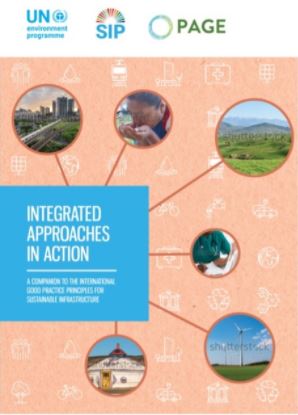As governments look to accelerate a green recovery from Covid-19, good practices, challenges and lessons learned from various country contexts can provide inspiration to build resilience to crises and drive forward the 2030 Agenda for Sustainable Development.
 We are therefore delighted that our work in Malawi is recognised by the United Nations Environment Programme (UNEP) today in Integrated approaches in action: A companion to the Good Practice Principles for Sustainable Infrastructure.
We are therefore delighted that our work in Malawi is recognised by the United Nations Environment Programme (UNEP) today in Integrated approaches in action: A companion to the Good Practice Principles for Sustainable Infrastructure.
Launched as part of the 5th UN Environment Assembly in Kenya the companion showcases global case studies illustrating the most salient aspects of the UNEP’s good practice principles which document integrated approaches in action. The companion emphasises the challenges facing infrastructure development and transparency in Malawi but highlights progress made over the past 10 years through CoST membership. It showcases CoST Malawi’s online portal, multi-stakeholder approach and other innovations which have enhanced data accessibility and scrutiny.
The key highlights
The Malawi study was selected to inform “UNEP Guiding Principle 10: Evidence-based decision-making focussed on regular monitoring of infrastructure performance and impacts, collecting and centralising disaggregated data, and making data available to a wide array of stakeholders”. The highlights in the case study relating to these areas are outlined below.
1. Improving data collection and availability
CoST Malawi’s Information Platform for Public Infrastructure provides a unique centralised online storage system for infrastructure data. To ensure data is uploaded to the system, CoST Malawi has worked closely with public officials to populate it. To ensure citizens and others then use the platform, its approach has included engagement with influential radio stations and using the popular ‘radio jingles’ to promote the platform and key findings.
2. Increased accountability
CoST Malawi’s Multi-Stakeholder Group has played a key role in improving infrastructure projects and spurring action on broader reforms. For example, the group was instrumental in the Parliament of Malawi passing a revised Public Procurement and Disposal of Public Assets Act that provides a legal obligation for procuring entities to disclose infrastructure data.
3. Sharing key issues through innovative events
Before and during Covid-19, CoST Malawi developed innovative ways to strengthen public participation. Taking a lead from CoST Uganda’s successful baraza approach, which ensures citizens bring key concerns to local decision-makers, it has facilitated similar events in the country’s Nsanje, Mzimba and Karonga districts.
In Nsanje, a community event focussed on the planned construction of dykes. Here, authorities outlined the potential impacts on the community, including reforestation and possible relocation of communities to higher areas, and in response the community expressed their concern over the lack of information shared about the plans, stressing how they had been excluded from planning stages. The authorities pledged to make improvements to address these issues and enhance greater public participation.
with over 80% of Malawi’s population living in rural areas effective means of disseminating insights from data is increasingly important.
Areas to address: Our next step to heighten environmental data transparency
Malawi has taken important steps to make data publicly available but as the case study outlines there remains a need to improve the collection, analysis and sharing of infrastructure data related to specific environmental and social sustainability issues.
To address this we facilitate learning across CoST members, encouraging members to look at adapting and using the successful innovation of CoST Honduras – InfraS – Sustainable Infrastructure. We are also building on our promotion of environmental data disclosure which is included as a data point within the CoST Infrastructure Data Standard, working with our partner the Open Contracting Partnership (OCP) to incorporate a comprehensive environmental data approach in our Open Contracting for Infrastructure Data Standard (OC4IDS).
The OC4IDS brings together the existing standards of CoST and OCP to ensure robust data disclosure across the entirety of the project cycle and to make data available in real time. With huge sums being spent in COVID-19 economic recovery packages, widely available and comprehensive data will be essential to strengthen accountability, provide better value for money, and drive forward the 2030 SDGs Agenda.
Click to read the companion and the good practice principles.
